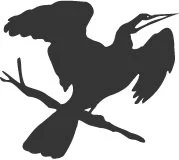
Who's Asking by Keith Ratzlaff
To say the poems in this remarkable collection balance on the fulcrum between grief and joy is too easy. It’s as though Keith Ratzlaff has roused the gods in their rosy heaven and demanded attention. Who’s Asking? is a book of questions — about the nature of wonder, of meaning, questions about being caught between earth and heaven like the angels of Paul Klee’s paintings who speak some of these poems. In other words, questions about the rigorous yet remorseless undertaking of being human. Large questions that bulge with “a terrible asking” but also those that bloom from close observation of the most ordinary circumstance. All of them shaded by the unrelenting awareness that “Nobody gets saved.” And yet this book is gifted with unexpected humor, unequivocal wisdom. A longtime fan of Keith Ratzlaff, I continue to marvel at his ability to pull hare after hare from a hat too small for any head, each time causing the hairs on the back of my neck to stand and applaud.
—Andrea Hollander
To potent and pulsing effect, Keith Ratzlaff’s speaker places himself and his thoughts in many times — a present moment of quietly watering his garden or thinking his storm-jolted plane is about to crash; Boccaccio’s Italy; the recent history of a fellow poet’s school suffering a mass shooting; third-century China in the company of another compatriot poet; or the no-time time of artist Paul Klee’s angels, with whom Ratzlaff has a fruitful obsession. Recalling a 1957 visit with friends to Bill’s barbershop, the smart/sad/hopeful voice of Who’s Asking? says, “we thought we could see ourselves / in the two facing walls of his mirrors, / reflecting both ways to infinity.” From such apparent daily-ness and simplicity, this poet culls complexities and cuts to our hearts.
—Stephen Corey
OVER
In the palace
they are calling this
the year of the palace.
In the fields they
are reading the book of rain.
In the house, curtains drawn,
it’s the year of opacity,
in the nursing home
it’s the year of the heart —
of the man whose pacemaker
kept beating ironically
for hours after he died —
year of my mother’s heart.
Su Shi called his pavilion
the tower of the golden rain
to commemorate a storm
that saved the crops.
This is not that year.
Call it paper cut, call it
tire tracks in the back yard,
the year of the drunk
veering off the alley
last night — hedge mangled,
black ruts in the grass —
the year of the moon
raising its white flag.
Call it her last day, lungs
filling like the pavilion’s ewers.
Call it the week before,
that surreal phone call
when she told me to
go to grass if I couldn’t
get her out of there.
Call it the ticking of the lamp,
the ticking of her watch —
new batteries that somewhere
must still be driving the gold hands.
Instead call it cry, call it cat
at the window, watching
a man with a chainsaw
roar through a pine across the road.
Go to grass which meant
go to hell, although she
couldn’t say it like that.
It’s the year of the torch,
of the urn, year of the page
not turned, year of saying
what I have to say once:
that small howl of her life —
I’m an orphan crying, or I am
too old to be an orphan? — over.
But the last night I saw her
she was luminous, hair washed,
sedate under a single lamp
in that bare room.
It was her birthday.
We took a picture.
ANGEL IN CRISIS
after Paul Klee
Dear God of doorways,
I’m here
with a bell around my neck,
here with my heart
ringing.
Every door is a judgment,
every house a crisis.
The last loss
I took sitting down —
my chest shrouded,
my head
a balloon, my hat pinned there.
I found out then
supplication
was a three-handed thing.
My two hands — everything
I could hold —
weren’t remotely enough
for this terrible asking.
Which seemed
beneath you, then,
as I am beneath you now.
Like a bee
at the window
asking for it.
Like a dog
in the driveway.
Any house is a judgment;
every prayer
a sieve, a winnowing.
Trouble doesn’t come
in threes,
but in hope —
in the gamble
of prayer
and the two-headed God
who can give
only
one answer.

